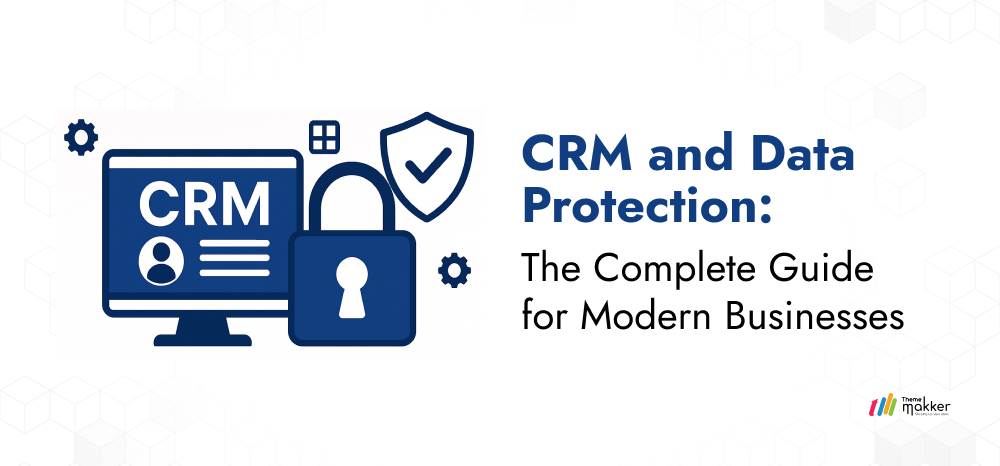In today’s digital world, customer data has become the backbone of business growth. Every click, purchase, and interaction feeds into powerful systems known as Customer Relationship Management (CRM) platforms. But with great data comes great responsibility, and that’s where Data Protection becomes essential.
This guide breaks down the relationship between CRM and Data Protection, how they impact your brand, and how to build a strategy that keeps customers loyal and compliant.
What Is CRM?
Customer Relationship Management (CRM) is a system or strategy that helps businesses manage interactions with potential and existing customers.
It’s not just software, it’s a business philosophy focused on improving relationships, increasing sales, and enhancing customer satisfaction.
🔹 Core Functions of a CRM
- Centralizes customer data
- Tracks communication and sales activity
- Automates marketing and follow-ups
- Helps personalize customer experiences
Popular CRMs: Salesforce, HubSpot, Zoho, Pipedrive, and Microsoft Dynamics.
🔒 What Is Data Protection?
Data Protection ensures that all personal and business data is securely stored, processed, and shared according to privacy regulations.
It’s about building trust and transparency while complying with global laws like:
- GDPR (Europe)
- CCPA (California)
- PDPA (Singapore)
- DPDP Act (India)
🔹 Key Data Protection Principles
- Collect only what’s necessary
- Be transparent about data use
- Store data securely
- Give users control over their information
- Delete data responsibly when no longer needed
⚙️ How CRM and Data Protection Work Together
A CRM system touches every part of a business, marketing, sales, and support. Because it stores personal information (names, emails, behavior data), data protection must be integrated at every level.
📊 Example:
When a CRM stores customer email and phone numbers, that data must be encrypted, access-controlled, and used only for the purpose it was collected.
Without protection, even the most powerful CRM can become a liability.
🔁 The CRM–Data Protection Balance

🧩 Why Data Protection Improves CRM Performance
Modern customers expect personalization, but also privacy. By protecting their data, you actually increase CRM effectiveness.
Here’s how:
- ✅ Builds customer trust → more users share data willingly.
- ✅ Ensures compliance → avoids fines and brand damage.
- ✅ Creates cleaner data → improves CRM insights and automation.
- ✅ Enables secure collaboration → across marketing and sales teams.
🔐 Best Practices for CRM Data Protection
- Encrypt all sensitive data (at rest and in transit).
- Use role-based access controls, not everyone should see everything.
- Anonymize or pseudonymize customer data when possible.
- Regularly audit CRM data to identify unnecessary records.
- Get explicit consent before collecting or using customer data.
- Train employees on privacy best practices.
- Integrate privacy tools like GDPR consent checkboxes, encryption APIs, and compliance dashboards.
🌍 Global Data Privacy Laws Affecting CRMs

📈 Future Trends in CRM and Data Protection
- AI-powered CRMs will automate data sorting but must follow ethical data use.
- Zero-party data (data customers willingly provide) will rise in importance.
- Real-time consent management will become standard practice.
- Blockchain and decentralized CRMs may redefine trust and transparency.
💬 Final Thoughts
A CRM without data protection is like a luxury car without brakes, powerful but dangerous.
To thrive in today’s business landscape, organizations must treat customer data with respect, integrate compliance into every CRM process, and make privacy a competitive advantage.
Businesses that get this balance right don’t just comply, they earn customer loyalty for life.
FAQs
- Q:: What is the role of data protection in CRM systems?
A:: Data protection ensures that all customer information stored within a CRM is securely managed, accessed, and processed in compliance with privacy laws like GDPR or CCPA. It helps prevent unauthorized access, data misuse, and security breaches while maintaining customer trust.
- Q:: How can businesses ensure their CRM is compliant with data privacy laws?
A:: To ensure compliance, businesses should use CRMs that support data encryption, consent management, and access controls. Regular audits, privacy impact assessments, and employee training are also essential to maintain compliance with local and global data protection regulations.
- Q:: What type of data does a CRM system typically store?
A:: A CRM generally stores personal and behavioral customer information such as names, email addresses, contact numbers, purchase history, communication logs, and engagement data. Because this data is sensitive, it must be handled under strict privacy and security protocols.
- Q:: Why is CRM security important for customer trust?
A:: When customers know their data is handled responsibly, they’re more willing to share accurate information. A secure CRM not only prevents data leaks but also strengthens brand reputation, customer confidence, and long-term loyalty.
THEMEFOREST
Exclusive Author
Boost Backend Efficiency with Cutting-Edge Web Technologies
Accelerate your backend development with our premium admin dashboard templates powered by today’s top frameworks and libraries—Bootstrap, Tailwind CSS, React, Vue.js, Angular, Laravel, Node.js, WordPress, Next.js, ASP.NET, and more. Whether you're building a SaaS platform, CRM, or internal tool, our dashboards offer clean design, modular code, and full responsiveness to help you build faster and smarter.
























